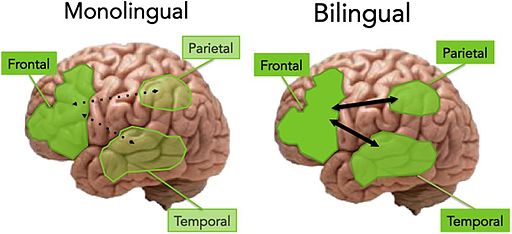This post was contributed by Professor Penelope Gardner-Chloros, of Birkbeck’s Department of Applied Linguistics and Communication
 A congress of blonds/blondes[1] is holding a maths quiz on stage, in order to show the world that blonds/es are not as dumb as they are made out to be. The first contestant has great hair but is really struggling with the question put to her: “What is 3+2?” Eventually she screws up her courage and ventures: “6?”
A congress of blonds/blondes[1] is holding a maths quiz on stage, in order to show the world that blonds/es are not as dumb as they are made out to be. The first contestant has great hair but is really struggling with the question put to her: “What is 3+2?” Eventually she screws up her courage and ventures: “6?”
The audience – made up of blonds/es – starts clapping but the compere interrupts: “I’m sorry, that is not correct”. The crowd roars: “Give her another chance! Give her another chance!” But when asked the sum of 4+1, the contestant stumbles again.
“Give her another chance! Give her another chance!”, the blonds/es chant once again. Finally she cries out “I’ve got it! It’s 5!” As one, the crowd roars out, “Give her another chance! Give her another chance!”
The audience at this contest might not be the ideal candidates for a university degree, but in the struggle to sign up students in difficult economic times, universities need to make themselves as attractive as possible to all potential applicants. Many of them are of course affected by which course has the lowest fees, the best location, the most famous professors. But how can we present the actual courses as attractively as possible?
Is ‘Linguistics’ too difficult?
 In Linguistics as in other subjects, this means keeping up with current issues and interests; for example, our department would ideally like to introduce an option on CMC[2] – not just out of a desire to be trendy, but because this is a serious issue affecting not only how we communicate but also language itself (see for example the recent Routledge Handbook of Language and Digital Communication, eds. Georgakopoulou and Spilioti).
In Linguistics as in other subjects, this means keeping up with current issues and interests; for example, our department would ideally like to introduce an option on CMC[2] – not just out of a desire to be trendy, but because this is a serious issue affecting not only how we communicate but also language itself (see for example the recent Routledge Handbook of Language and Digital Communication, eds. Georgakopoulou and Spilioti).
Another aspect of being attractive is to do with what courses, and even departments, are called. Two of my earlier blogs are relevant here: one about the – almost magical – power of names, and another about how Linguistics is among the least well understood of academic disciplines. In the second one, I was thinking of the public in general rather than potential students. The latter, one would hope, might at least have looked the word up on Wikipedia. However some colleagues seem to be taking the need to be attractive to heart…perhaps too much? It has been suggested that the term ‘Linguistics’ is too difficult, too intellectual, too off-putting. We should call our department and our courses by some other name. We have already become a Department of Applied Linguistics and Communication, but that was not in order to be more attractive; it is because we are now teaching a completely different subject alongside linguistics.
The study of Communication does not require burning the midnight oil over phonetics, phonology, syntax, morphology, language change, sociolinguistics, psycholinguistics, bilingualism, semantics, pragmatics – to mention but a few of the sub-categories within linguistics – and has indeed proved a crowd-puller. But does that mean we should get rid of “Linguistics”??? And that because potential students applying for postgraduate courses can’t understand what it means ?!?? Surely even in these straightened times, there are some students we actually do not want.
‘Stuff about language’
It does make you think though. How much better the History Department’s recruitment would be if it was renamed the Department of Things that Happened in the Past (or, as they define it in the History Boys, One Bloody Thing after the Other). Physics could be renamed How Objects Behave.
Why talk of Geography when you could make millions in fees by calling it Where People and Mountains Are? Economics could be How to Spend It (or Not) – though the Financial Times supplement got there first; Law could be Rules you Had Better Obey; Philosophy could be Thinking it Through, and even Media Studies could surely be made (even) more attractive by being renamed Watching the Box. Exciting possibilities.
But Linguistics? What else could we call it, with all those tiresome sub-disciplines? Stuff about Language? Suggestions from readers would be welcome – and if all else fails, I guess we could always ask a blond(e).
Find out more
- Courses in the Department of Applied Linguistics and Communication
- Professor Penelope Gardner-Chloros
- Follow Professor Gardner-Chloros on Twitter @ChlorosP
[1] Linguistic fact of the day: did you know this was the only English adjective to be marked for gender?
[2] Computer-mediated communication














